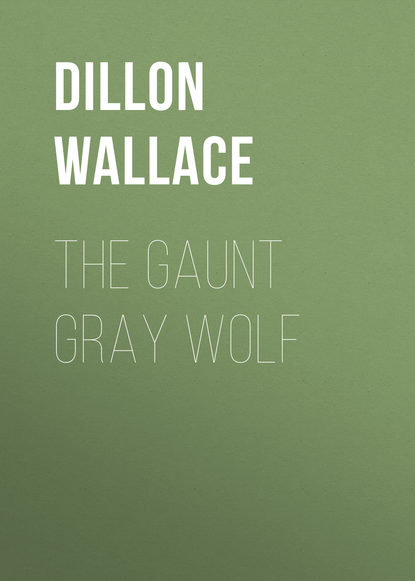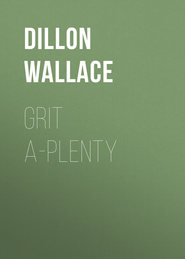По всем вопросам обращайтесь на: info@litportal.ru
(©) 2003-2024.
✖
The Gaunt Gray Wolf
Настройки чтения
Размер шрифта
Высота строк
Поля
As they arose to retire to their tent the dead silence of the wilderness was startled by the uncanny cry of a loon. Bob stood for a moment and listened. Then, turning to the tent, he remarked:
"'Tis a bad sign, when a loon laughs at night like that!"
"In what way?" asked Shad.
"'Tis said t' be a warnin' o' danger an' trouble."
In a series of portages from lake to lake they passed the next day through six lakes of varying size, caching traps now and again at convenient points for future use.
All the afternoon a low, rumbling sound was to be heard. Time and again they halted to listen. It was a changeless, sullen, muffled roar. Finally, when they reached the sixth lake, later in the afternoon, their curiosity got the better of them and they climbed a barren eminence to investigate. As they neared the summit the roar increased in volume, and when they reached the top and looked to the southward they beheld a cloud of vapour.
"'Tis th' Great Falls o' th' Injuns!" exclaimed Bob.
"Where the evil spirits dwell?" asked Shad.
"Aye, where th' evil spirits dwell." Around them lay a rugged scene of sub-Arctic grandeur. To the eastward the country was dotted with a network of small lakes similar to those through which they had been travelling, while to the northward a much larger lake appeared. The shores of these lakes supported a forest of black spruce, but every rise of ground was destitute of other growth than the gray caribou lichen which everywhere carpets the Labrador forest.
"There's a grand chance t' lay th' trails," said Bob. "We'll be makin' our trails along th' s'uth'ard lakes an' up t' that big lake, an' Ed's among th' lakes t' th' n'uth'ard."
"I'd like to see those falls," suggested Shad. "Can't we take the morning off to visit them?"
"An' you wants," agreed Bob. "We'll be buildin' a tilt down where th' canoe is, an' another on th' first lake, an' I'm thinkin' another on th' big lake above."
Accordingly the following morning, leaving their camp pitched and their canoe on the lake shore, they turned southward upon an exploring expedition. Their tramp carried them across a series of ridges and bogs and finally into a forest. With every step the roar increased, and at length they could plainly feel the earth tremble beneath their feet.
Suddenly they emerged from the forest to behold a scene of wild and sublime grandeur. They stood at the very brink of a mighty chasm. From far above them the river rushed down, a stupendous torrent of foam-crested billows and swirling whirlpools, impatient to make its leap into the depths at their feet where it was presently to be swallowed up in a bank of mist, which shimmered beneath the two adventurers like a giant opal lighted by all the colours of the rainbow. Below the rainbow-coloured mist the river again appeared, rushing in fearful power past beetling, frowning cliffs, which directly hid it from view. The very rocks upon which they stood trembled, and a reverberating roar rose from the canyon at their feet, so loud that conversation was well-nigh impossible.
[Footnote: These are the Grand Falls of Labrador. The river falls three hundred and sixteen feet with a single leap.]
For half an hour they stood enthralled by the scene, then they turned up the river, walking along its bank.
"'Tis an awful place down there," remarked Bob. "I'm not wonderin', now, th' Injuns thinks 'tis possessed by evil spirits."
"It is the most sublime scene I ever beheld," declared Shad. "One glimpse of it is worth all the trouble we've had in getting here."
The river gradually widened, but always with a strong current, even above the heavy white rapids, until some five miles above the falls it expanded into a large island-dotted lake. At the extreme lower end of this lake the old Indian portage trail was discovered, and following it the explorers late in the day reached their camp.
The following weeks were devoted to the erection of tilts–small log cabins to be used in winter as shelter. One was established well up the shores of the large lake expansion above the falls, another upon the shores of the lake from which they had made their excursion to the falls, and still another upon the first lake above the river tilt of the Big Hill trail, while to the northward near other lakes four other tilts were erected, at convenient distances apart, for Ed's use.
These tilts were all constructed upon the same general plan. They were on an average about eight by ten feet in size, with a slightly sloping roof so low in the rear Bob could scarcely stand erect.
The chinks between the logs were filled with caribou moss. The roof logs were covered with boughs, over which was spread first a blanket of moss and then a coating of six inches of earth. Each was provided with a doorway about four feet in height and two and a half feet wide, which was fitted with a door constructed of lashed saplings covered with bark.
Within, a platform of flat stones was arranged to accommodate the sheet-iron stove, with a stove-pipe hole through the roof directly over it.
Long, springy saplings were utilised in erecting bunks at the rear and along the side of the tilt opposite the stove. These were later to be covered with spruce boughs, and would serve both as beds and seats, and were elevated some eighteen inches above the earth floor.
"They'll be warm an' snug," said Bob. "When frosty weather an' winter comes th' snow soon banks un up an' covers un up, roof and all, and makes un good an' tight."
"But how do you get air enough to breathe?" asked Shad.
"Th' stove-pipe hole is made plenty big," explained Bob, "an' that lets th' bad air out, an' we mostly has a snow tunnel leadin' t' th' door so th' wind won't strike in, an' leavin' th' door off, th' good air comes in."
Nearly four weeks had been consumed in this work, and without waiting for the reappearance of their friends they began at once the distribution of supplies among the tilts, for September was nearly spent and winter would be upon them by mid-October, when ice in the lakes would render the canoe useless.
Therefore, with all haste they proceeded with their first canoe-load of provisions to the farthest tilt, built upon the shores of the lake expansion above the falls.
It was mid-forenoon of a beautiful, transparent September day when they reached the tilt. The supplies were quickly stowed beneath the bunks, the tent stove erected, and, halting only long enough to make tea, they launched their canoe for the return.
"We'll be makin' th' river tilt before we sleeps," said Bob. "They's a moon, an' we'll finish by moonlight, an' to-morrow we'll be gettin' out with th' next load. If we travels fast we can make th' river tilt before midnight, whatever!"
The portage trail left the river at a point some ten miles below the tilt, and as previously stated, at the lower end of the lake, where the current began to gather strength for its final tumultuous rush toward the falls.
They had paddled the distance in two hours, and were congratulating themselves upon their good progress as they turned the canoe toward the portage landing, when suddenly they were startled by a burst of wild, bloodcurdling whoops, and a half-dozen strange Indians, guns levelled, rose upon the shore.
"Mingens!" exclaimed Bob.
A warning in the Indian tongue was shouted at them that they must not attempt to land. A shot was fired over their heads to emphasise the fact that the savages were in earnest, and with no alternative, and taken wholly by surprise, Shad at the steersman's paddle astern, swung the canoe out into the stream, still continuing down the river.
"Upstream! Upstream! Turn about!" shouted Bob.
In the excitement and confusion that followed the first few moments after the attack, much valuable time had been lost in ineffectual manoeuvres, and when the canoe was finally turned about they were far out into the stream, and it was found that the insidious current had caught them. Bob was the first to recognise the danger, and in a sharp, tense voice he commanded:
"Quick! Work for your life! If th' rapid gets us, 'twill carry us over th' falls!"
Then they paddled–paddled as none had ever paddled before. But already the powerful current had them in its grip. Slowly–slowly–but with increasing speed they were drifting toward the awful cataract.
They would have braved the Indians now, and attempted a landing, but from a point directly below the portage trail, and extending to the white water of the heavy rapids the river bank rose in a perpendicular rampart of smooth-scoured rock, a full ten feet in height, offering no possible foothold.
For a little while they hoped, as they worked like madmen. Then the full import of their position dawned upon them–that they were hopelessly drifting toward the brink of the awful cataract.
Beads of cold perspiration broke out upon their foreheads. A sickening numbness came into their hearts, and as in a dream they heard the derisive, exultant yells of the savages upon the shore.
VIII
AFTER THE INDIAN ATTACK
Below them rose the appalling roar of the hungry rapids and the dull, thunderous, monotonous undertone of the falls themselves.
Before their vision a vivid picture passed of the scene they had so recently beheld–the onrushing, white piled billows above the cataract, gathering strength for their mighty leap–the final plunge of the resistless torrent–the bank of rainbow-coloured mist hovering in space over a dark abyss–and far below and beyond the mist-bank the murky chasm, where a white seething flood was beating its wild anger out against jagged rocks in its mad endeavour to fight its way to freedom between narrow canyon walls rising in frowning cliffs on either side.
Impotent to resist the power that was drawing them down, Shad Trowbridge and Ungava Bob were certain beyond a doubt that presently they were to be hurled into this awful chasm, and that in all human probability but a few minutes more of life remained to them.
Then suddenly there flashed upon Bob's memory the recollection of an island which he had observed when walking along the river bank from the falls to the portage trail.
He remembered that this island was of curious formation, with high polished cliffs rising on its upper end and on either side, like bulwarks to guard it from the rushing tide.
At its lower end a long, low, gravelly point reached downward, like a pencil point, among the swirling eddies. The gravel which formed this point, he had remarked at the time, had been deposited by the eddies created by the meeting of the waters where they rushed together from either side below the island.








